初中英语语法 非谓语动词总结
- 格式:doc
- 大小:89.00 KB
- 文档页数:12
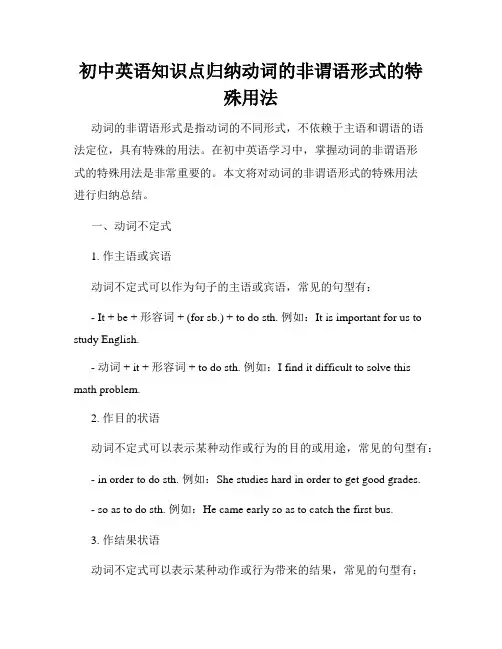
初中英语知识点归纳动词的非谓语形式的特殊用法动词的非谓语形式是指动词的不同形式,不依赖于主语和谓语的语法定位,具有特殊的用法。
在初中英语学习中,掌握动词的非谓语形式的特殊用法是非常重要的。
本文将对动词的非谓语形式的特殊用法进行归纳总结。
一、动词不定式1. 作主语或宾语动词不定式可以作为句子的主语或宾语,常见的句型有:- It + be + 形容词 + (for sb.) + to do sth. 例如:It is important for us to study English.- 动词 + it + 形容词 + to do sth. 例如:I find it difficult to solve this math problem.2. 作目的状语动词不定式可以表示某种动作或行为的目的或用途,常见的句型有:- in order to do sth. 例如:She studies hard in order to get good grades.- so as to do sth. 例如:He came early so as to catch the first bus.3. 作结果状语动词不定式可以表示某种动作或行为带来的结果,常见的句型有:- so + 形容词/副词 + as to do sth. 例如:He ran so fast as to win the race.- such + 名词 + as to do sth. 例如:She is such a kind girl as to help anyone in need.4. 作补语动词不定式可以作为某些动词的宾语补足语,常见的动词有:want, would like, hope, promise, expect等。
例如:- I want to be a doctor when I grow up.- She promised to take care of the dog.二、动词- ing 形式1. 作主语动词- ing 形式可以作为句子的主语,常见的句型有:- Swimming is my favorite sport.- Studying hard is the key to success.2. 作宾语动词- ing 形式可以作为动词的宾语,常见的动词有:enjoy, like, dislike, love, hate等。
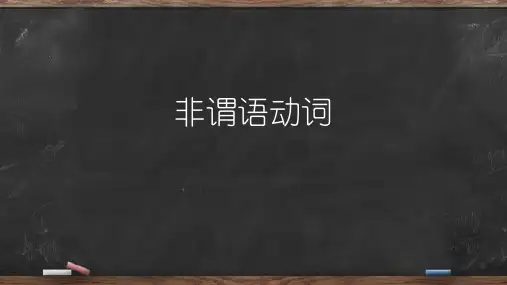

初中英语语法讲解——非谓语动词非谓语动词在句子中充当除谓语以外的句子成分的动词形式叫做非谓语动词。
非谓语动词分为三种形式:不定式,动名词,和分词(分词包括现在分词和过去分词)。
1)不定式a. 有些动词可以用动名词作宾语。
例如:2. worth 的用法worth, worthy, worthwhile都是形容词,意为"值得"。
1) worth:be worth + n.当名词为金钱时,表示"…… 值得……"常见的有It ’s worth while to do./ It ’s worth(someone’s)while doingbe worth doing sth."……某事值得被做"The question is not worth discussing again and again. 这问题不值得反复讨论。
2) worthy:be worthy of +n.当名词为抽象名词时表示"……值得……"be worthy to be done "某事值得被做"The question is not worthy to be discussed again and again.3) worthwhile:be worthwhile to do sth"值得做某事"It is worthwhile to ask him to join the club.值得邀请他加入俱乐部。
典型例题It is not ____ to discuss the question again and again.A. worthB. worthyC. worthwhileD. worth while答案C. 由worth的用法可知,此句只适合词组be worthwhile to do sth.。
选C。
动词不定式动词不定式由to+动词原形构成。
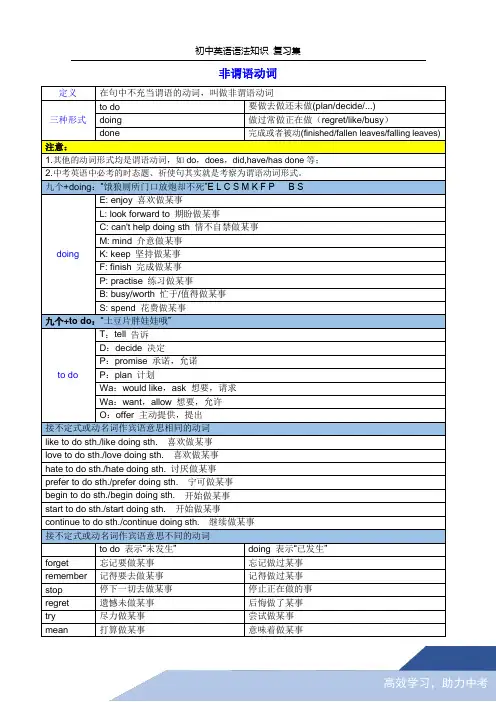
非谓语动词定义在句中不充当谓语的动词,叫做非谓语动词三种形式to do 要做去做还未做(plan/decide/...)doing 做过常做正在做(regret/like/busy)done 完成或者被动(finished/fallen leaves/falling leaves)注意:1.其他的动词形式均是谓语动词,如do,does,did,have/has done等;2.中考英语中必考的时态题、祈使句其实就是考察为谓语动词形式。
九个+doing:“饿狼厕所门口放炮却不死”E L C S M K F P B Sdoing E: enjoy 喜欢做某事L: look forward to 期盼做某事C: can't help doing sth 情不自禁做某事M: mind 介意做某事K: keep 坚持做某事F: finish 完成做某事P: practise 练习做某事B: busy/worth 忙于/值得做某事S: spend 花费做某事九个+to do:“土豆片胖娃娃哦”to do T:tell 告诉D:decide 决定P:promise 承诺,允诺P:plan 计划Wa:would like,ask 想要,请求Wa:want,allow 想要,允许O:offer 主动提供,提出接不定式或动名词作宾语意思相同的动词like to do sth./like doing sth. 喜欢做某事love to do sth./love doing sth. 喜欢做某事hate to do sth./hate doing sth. 讨厌做某事prefer to do sth./prefer doing sth. 宁可做某事begin to do sth./begin doing sth. 开始做某事start to do sth./start doing sth. 开始做某事continue to do sth./continue doing sth. 继续做某事接不定式或动名词作宾语意思不同的动词to do 表示“未发生”doing 表示“已发生”forget 忘记要做某事忘记做过某事remember 记得要去做某事记得做过某事stop 停下一切去做某事停止正在做的事regret 遗憾未做某事后悔做了某事try 尽力做某事尝试做某事mean 打算做某事意味着做某事can't help 不能帮助做某事情不自禁做某事go on 做完某事后接着做另一件事继续做同一件事动词不定式省略to的三种情况1.使役动词使/让某人做某事使/让某人....make make sb do sth make sb+ adjlet let sb do sth let sb +adj2.感官实义动词doing 表示“正发生;反复的动作”do表示“经常发生;动作全过程”see 看见某人正在做某事看见某人经常做某事/全过程watch 看见某人正在做某事看见某人经常做某事/全过程hear 听见某人正在做某事听见某人经常做某事/全过程notice 注意到某人正在做某事听见某人经常做某事/全过程3.had better(not)do sth最好做某事/would rather(not)do sth宁愿做某事4.help to (do) sth注意:在用于被动语态时,to要还原She is made to our monitor.动词不定式to do 的用法①作主语It’s nice to hear from you.②作宾语I forgot to lock the door.③作宾补He ordered her to leave at once.④作表语My job is to pick up letters.⑤作定语He is always the first one to get there.⑥作状语常常翻译成“为了...”。
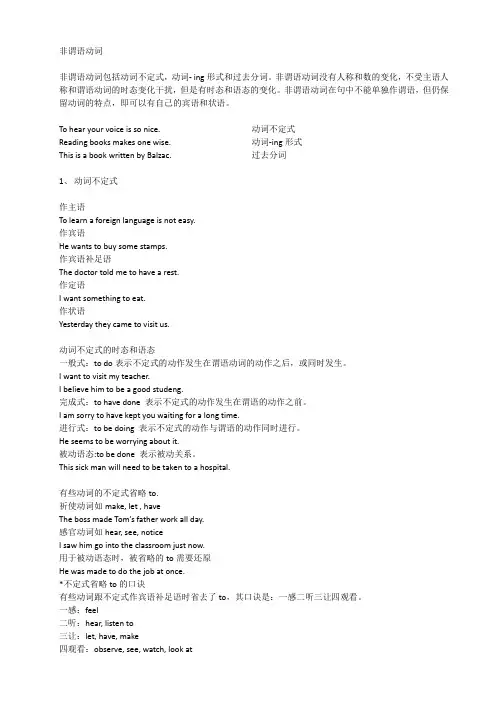
非谓语动词非谓语动词包括动词不定式,动词- ing形式和过去分词。
非谓语动词没有人称和数的变化,不受主语人称和谓语动词的时态变化干扰,但是有时态和语态的变化。
非谓语动词在句中不能单独作谓语,但仍保留动词的特点,即可以有自己的宾语和状语。
To hear your voice is so nice. 动词不定式Reading books makes one wise. 动词-ing形式This is a book written by Balzac. 过去分词1、动词不定式作主语To learn a foreign language is not easy.作宾语He wants to buy some stamps.作宾语补足语The doctor told me to have a rest.作定语I want something to eat.作状语Yesterday they came to visit us.动词不定式的时态和语态一般式:to do表示不定式的动作发生在谓语动词的动作之后,或同时发生。
I want to visit my teacher.I believe him to be a good studeng.完成式:to have done 表示不定式的动作发生在谓语的动作之前。
I am sorry to have kept you waiting for a long time.进行式:to be doing 表示不定式的动作与谓语的动作同时进行。
He seems to be worrying about it.被动语态:to be done 表示被动关系。
This sick man will need to be taken to a hospital.有些动词的不定式省略to.祈使动词如make, let , haveThe boss made Tom’s father work all day.感官动词如hear, see, noticeI saw him go into the classroom just now.用于被动语态时,被省略的to需要还原He was made to do the job at once.*不定式省略to的口诀有些动词跟不定式作宾语补足语时省去了to,其口诀是:一感二听三让四观看。

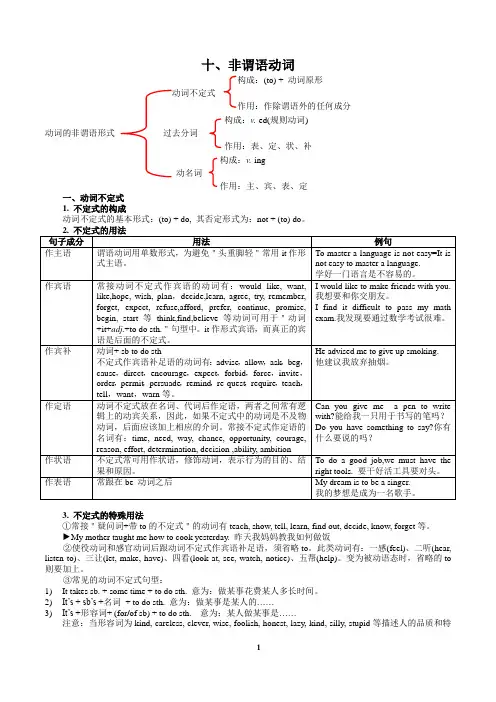
十、非谓语动词构成:(to) + 动词原形动词不定式作用:作除谓语外的任何成分构成:v.-ed(规则动词)动词的非谓语形式过去分词作用:表、定、状、补构成:v.-ing动名词作用:主、宾、表、定一、动词不定式1. 不定式的构成动词不定式的基本形式:(to) + do, 其否定形式为:not + (to) do。
3. 不定式的特殊用法①常接"疑问词+带to的不定式"的动词有teach, show, tell, learn, find out, decide, know, forget等。
►My mother taught me how to cook yesterday. 昨天我妈妈教我如何做饭②使役动词和感官动词后跟动词不定式作宾语补足语,须省略to。
此类动词有:一感(feel)、二听(hear, listen to)、三让(let, make, have)、四看(look at, see, watch, notice)、五帮(help)。
变为被动语态时,省略的to 则要加上。
③常见的动词不定式句型:1)It takes sb. + some time + to do sth. 意为:做某事花费某人多长时间。
2)It’s + sb’s +名词+ to do sth. 意为:做某事是某人的……3)It’s +形容词+ (for/of sb) + to do sth. 意为:某人做某事是……注意:当形容词为kind, careless, clever, wise, foolish, honest, lazy, kind, silly, stupid等描述人的品质和特点的词时,应选择介词of,其他情况选择for。
④常见的一些不带to的动词不定式:Why not do …? Why don’t you do …? had better(not) do …, would rather do…, Could/Will/Would you please do …? 例如:I would rather stay in the room. 我宁愿呆在家里。

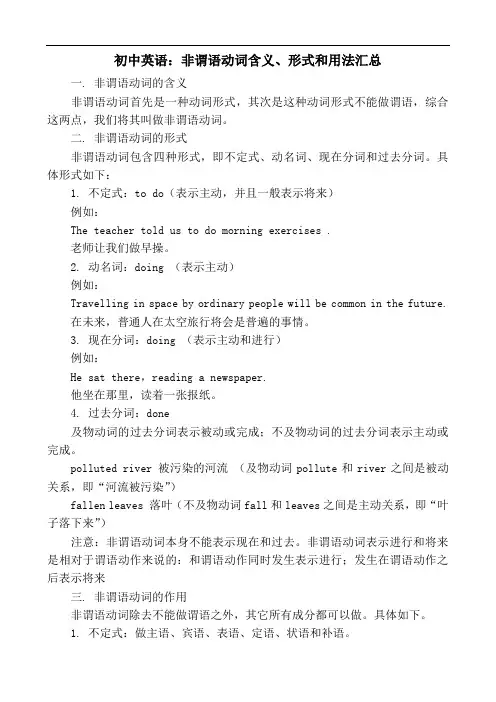
初中英语:非谓语动词含义、形式和用法汇总一. 非谓语动词的含义非谓语动词首先是一种动词形式,其次是这种动词形式不能做谓语,综合这两点,我们将其叫做非谓语动词。
二. 非谓语动词的形式非谓语动词包含四种形式,即不定式、动名词、现在分词和过去分词。
具体形式如下:1. 不定式:to do(表示主动,并且一般表示将来)例如:The teacher told us to do morning exercises .老师让我们做早操。
2. 动名词:doing (表示主动)例如:Travelling in space by ordinary people will be common in the future.在未来,普通人在太空旅行将会是普遍的事情。
3. 现在分词:doing (表示主动和进行)例如:He sat there,reading a newspaper.他坐在那里,读着一张报纸。
4. 过去分词:done及物动词的过去分词表示被动或完成;不及物动词的过去分词表示主动或完成。
polluted river 被污染的河流(及物动词pollute和river之间是被动关系,即“河流被污染”)fallen leaves 落叶(不及物动词fall和leaves之间是主动关系,即“叶子落下来”)注意:非谓语动词本身不能表示现在和过去。
非谓语动词表示进行和将来是相对于谓语动作来说的:和谓语动作同时发生表示进行;发生在谓语动作之后表示将来三. 非谓语动词的作用非谓语动词除去不能做谓语之外,其它所有成分都可以做。
具体如下。
1. 不定式:做主语、宾语、表语、定语、状语和补语。
To learn a foreign language is difficult .(作主语)学会一门外语是很难的。
It’s easy to see their aunt.(作真正主语,it做形式主语)很容易见到他们的姑姑。
Tom wanted to have a cup of beer.(作宾语)汤姆想要喝杯啤酒。
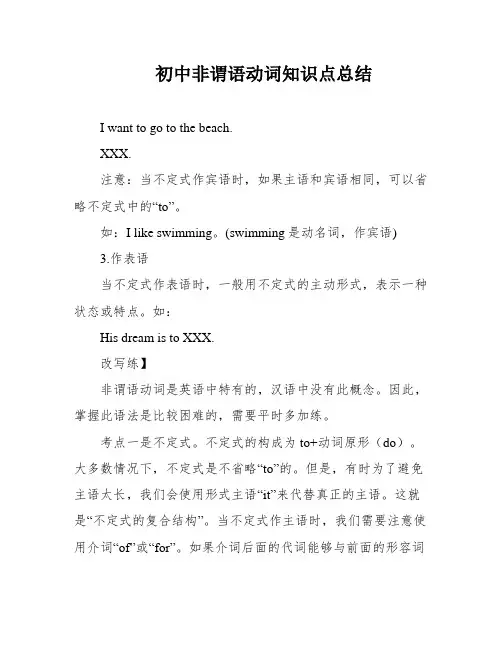
初中非谓语动词知识点总结I want to go to the beach.XXX.注意:当不定式作宾语时,如果主语和宾语相同,可以省略不定式中的“to”。
如:I like swimming。
(swimming是动名词,作宾语)3.作表语当不定式作表语时,一般用不定式的主动形式,表示一种状态或特点。
如:His dream is to XXX.改写练】非谓语动词是英语中特有的,汉语中没有此概念。
因此,掌握此语法是比较困难的,需要平时多加练。
考点一是不定式。
不定式的构成为to+动词原形(do)。
大多数情况下,不定式是不省略“to”的。
但是,有时为了避免主语太长,我们会使用形式主语“it”来代替真正的主语。
这就是“不定式的复合结构”。
当不定式作主语时,我们需要注意使用介词“of”或“for”。
如果介词后面的代词能够与前面的形容词构成主谓逻辑关系,我们使用介词“of”。
反之,我们使用介词“for”。
不定式还可以作宾语。
在这种情况下,不定式表示一种打算、希望或命令等。
如果主语和宾语相同,我们可以省略不定式中的“to”。
当不定式作表语时,我们一般使用不定式的主动形式,表示一种状态或特点。
I hope to read English magazines every day。
Reading English magazines every day is my goal.I have decided to XXX.Some XXX infinitives as objects include want。
determine。
decide。
hope。
plan。
except。
and would like.Certain verbs such as advice。
ask。
force。
persuade。
allow。
tell。
encourage。
order。
and want can take XXX。
For example。
our teachers asked us to XXX。

初中英语语法非谓语动词总结非谓语动词主要包括不定式、动名词和现在分词。
为了区分这三种不同的非谓语动词的用法和含义,我们将分别从三种非谓语动词在句子中做主语、宾语、宾语补足语、定语、状语、表语以及一些特殊结构句型等角度来区分其用法和细微含义。
1.不定式和动名词作主语的区别(1)动名词作主语通常表示抽象动作;而不定式作主语表示具体动作。
Smoking is prohibited(禁止)here.这里禁止抽烟。
(抽象)It is not very good for you to smoke so much.你抽这么多烟对你身体很不好。
(具体)(2)动名词作主语时,通常用以表示一件已知的事或经验。
不定式短语通常用来表示一件未完成的事或目的。
Climbing mountains is interesting.爬山很有趣。
(经验)Driving a car during the rush hour is tiring.在高峰时刻开车令人厌烦。
(经验) (3)不定式做主语,一般用it当形式主语,把作主语的不定式短语后置。
It took me only five minutes to finish the job.2.不定式、动名词和分词作表语的区别(1)不定式作表语1)不定式作表语一般表示具体动作,特别是表示将来的动作。
To do two things at a time is to do neither.--次做两件事等于未做。
What I would suggest is to start work at once.我的建议是立刻开始干。
2)如果主语是不定式(表示条件),表语也是不定式(表示结果)。
To see is to believe.百闻不如一见。
To work means to earn a living.工作就是为了生活。
3)如果主语是以aim,duty,hope,idea,happiness,job,plan,problem,purpose,thing,wish等为中心的名词,或以what引导的名词性从句,不定式作表语是对主语起补充说明作用。
His wish is to buy a luxurious car in the near future.他的希望是在不远的将来买一辆豪华轿车。
The function of Louis Sullivan's architecture was to provide large uninterrupted floor areas and to allow ample light into the interior.The most important thing is to negotiate with them about the future of the plant.(2)动名词作表语:动名词作表语,表示抽象的一般性的行为。
Our work is serving the people.我们的工作是为人民服务。
His hobby is collecting stamps.他的爱好是集邮。
(注)动名词作表语时与进行时态中的现在分词形式相同,但其所属结构迥异,进行时态说明动作是由主语完成的。
动名词做表语,说明主语的性质或情况。
People cannot but feel puzzled,for they simply cannot understand how he could have made such a stupid mistake.His victory in the final was no more convincing than I had expected.(3)分词作表语分词做表语有两种情况,一种是现在分词做表语,一种是过去分词做表语,这两者区别是考试中经常考到的地方。
一般来说,表示心理状态的动词如excite,interest等都是及物动词,汉语意思不是“激动”,“高兴”,而是“使激动”、“使高兴”,因而现在分词应该是“令人激动的”、“令人高兴的”,过去分词则是“感到激动的”和“感到高兴的”。
所以,凡表示“令人……的”都是-ing形式,凡是表示“感到……”都用-ed形式。
换句话说,若人对……感兴趣,就是somebody is interested in...,若人/物本身有兴趣时,就是说sb./sth. is interesting.这类词常见的有:interesting使人感到高兴--interested感到高兴的exciting令人激动的--excited感到激动的delighting令人高兴的--delighted感到高兴的disappointing令人失望的--disappointed感到失望的encouraging令人鼓舞的--encouraged感到鼓舞的pleasing令人愉快的--pleased感到愉快的puzzling令人费解的--puzzled感到费解的satisfying令人满意的---satisfied感到满意的surprising令人惊异的--surprised感到惊异的worrying令人担心的--worried感到担心的Travelling is interesting but tiring.旅行是有趣的,但是使人疲劳。
The pupils will get confused if they are made to learn too much.如果要学生学得太多,他们会感到糊涂的。
The argument is very convincing.他的论点很令人信服。
They were very excited at the news.听到这个消息,他们非常激动。
3.不定式和动名词作宾语的区别英语中大多数动词既可跟不定式,也可跟动名词作直接宾语,但有些动词要求:(1)不定式做宾语和宾语补足语1)下面的动词要求不定式做宾语attempt企图enable能够neglect忽视afford负担得起demand要求long渴望arrange安排destine注定mean意欲,打算begin开始expect期望omit忽略,漏appear似乎,显得determine决定manage设法cease停止hate憎恨,厌恶pretend假装ask问dread害怕need需要agree同意desire愿望love爱swear宣誓volunteer志愿wish希望bear承受endeavor努力offer提供beg请求fail不能plan计划bother扰乱;烦恼forget忘记prefer喜欢,宁愿care关心,喜欢happen碰巧prepare准备decide决定learn学习regret抱歉,遗憾choose选择hesitate犹豫profess表明claim要求hope希望promise承诺,允许start开始undertake承接want想要consent同意,赞同intend想要refuse拒绝decide决定learn学习vow起contrive设法,图谋incline有…倾向propose提议seek找,寻觅try试图2)下面的动词要求不定式做宾补:动词+宾语+动词不定式ask要求,邀请get请,得到prompt促使allow允许forbid禁止prefer喜欢,宁愿announce宣布force强迫press迫使bride 收买inspire鼓舞request请求assist协助hate憎恶pronounce断定,表示advise劝告exhort告诫,勉励pray请求authorize授权,委托help帮助recommend劝告,推荐bear容忍implore恳求remind提醒beg请求induce引诱report报告compel强迫invite吸引,邀请,summon传唤command命令intend想要,企图show 显示drive驱赶mean意欲,打算train训练cause引起instruct指示require要求deserve应受leave使,让tell告诉direct指导like喜欢tempt劝诱entitle有资格order命令warn告诫enable使能够need需要urge激励,力说encourage鼓励oblige不得不want想要condemn指责,谴责lead引起,使得teach教entreat恳求permit允许wish希望(2)有少数动词只能用动名词作宾语acknowledge承认,自认cease 停止mention说到,讲到admit 承认tolerate忍受dislike不喜欢,讨厌advocate:提倡,主张complete完成dread可怕appreciate 感激,欣赏confess坦白endure忍受avoid避免contemplate细想enjoy享有,喜爱bear忍受defer拖延envy嫉妒can't help不禁delay延迟escape逃跑,逃避can't stand受不了deny否认excuse借口consider 考虑detest嫌恶fancy幻想,爱好favor 造成,偏爱mind 介意repent悔悟figure描绘,计算miss错过resent怨恨finish完成,结束不得pardon原谅,饶恕resist抵抗,阻止forgive原谅permit 允许resume恢复imagine设想postpone延迟,延期risk冒险involve卷入,包含practise 实行,实践suggest建议hate讨厌prevent阻止save营救,储蓄keep保持quit放弃停止stand坚持,忍受loathe非常讨厌,厌恶recall回想例如:I appreciate having been given the opportunity to study abroad two years ago.3)有些动词后使用动名词和动词不定式作宾语的差别1)forget to do 忘记要去做某事(此事未做)forget doing忘记做过某事(此事已做过或已发生)2)stop to do 停止、中断(某件事),目的是去做另一件事stop doing 停止正在或经常做的事3)remember to do 记住去做某事(未做)remember doing记得做过某事(已做)4) regret to do对要做的事遗憾regret doing对做过的事遗憾、后悔5)try to do努力、企图做某事try doing试验、试一试某种办法6) mean to do打算,有意要…mean doing意味着7)go on to do 继而(去做另外一件事情)go on doing 继续(原先没有做完的事情)8)propose to do 打算(要做某事)proposing doing建议(做某事)9) like /love/hate/ prefer +to do 表示具体行为;+doing sth 表示抽象、倾向概念(注)如果这些动词前有should一词,其后宾语只跟不定式,不能跟动名词。